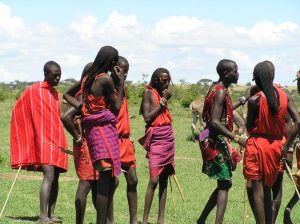Is African tourism truly maximizing its potential, or is it too reliant on traditional source markets seeking traditional experiences?

Increasingly, travel professionals are urging the continent to broaden its focus to include the rich diversity of its cultural, historical and artistic offerings.
“The safari world is a niche that makes one think of tented camps and copper baths. This has created an industry that operates in a bubble, which is more of a hindrance to growth than we realize,” said Suzanne Bayly, managing director of Classic Portfolio, which operates a number of camps and lodges on the continent.
“Let Africa not be defined by the safari bubble but rather burst that wide open and look at the diversity of culture, music, art and other aspects that make this continent so phenomenal. This has a wider appeal and will also speak to a market that wants to see beyond just the savannahs of Africa and discover the rhythm and life of the continent.”
This broader approach has the potential to attract a lucrative demographic: the growing market of Black American travelers.
This segment represents a significant economic force, with a total leisure travel spend of $109 billion in 2019 (the most recent full year available), according to MMGY Global’s 2020 The Black Traveler: Insights, Opportunities and Priorities Report, of which nearly a fifth of that total was spent on international trips.
Insights from Mandala Research further illustrate that among Black American travelers, those focused on cultural experiences have both a vested interest in connecting with Black history and traditions and represent the highest average spend per trip
For many Black Americans, travel to Africa represents a profound connection to their heritage. Felicia R. Fencl of First Choice Travel Group explained: “Descendants of those who were a part of the diaspora have recently sought to return to the root of their existence.”
Cynika Drake, founder of Lavish Lifestyles Concierge, agreed, saying there is a clear increase in interest from Black Americans to connect with their roots. “We are finding there is a high desire for culturally immersive experiences, connecting with local people and feeling a genuine connection with the destination,” she said.
For Nadia Henry, owner of Travel With Sparkle and a Travel Weekly columnist, media coverage, celebrity endorsements and initiatives like Ghana’s “Year of Return” have also inspired a greater desire to connect with Africa’s heritage. Next on the list of interests are culinary travel and art travel with wildlife ranking much lower on the list of priorities.
Mefi Pishori Alapat, safari designer with Journey to Africa, shares the positive experiences she’s had arranging personalized cultural encounters for Black American clients, such as time spent with local tribes, visits to historical sites and even seeking out Black-owned businesses like wineries.
“In Tanzania and Kenya, they requested spending time with the local tribes like the Maasai, Hadzabe and Samburu or tours in historic Stone Town or Lamu, Kenya,” Alapat said. “We love adding these experiences to any itineraries, but to Black Americans these interactions become personal, which makes it extra special for us.”
Shifting focus
Of course, the safari will always remain an iconic African draw. However, the experience itself is becoming more diverse. Travel industry experts are observing a shift away from the traditional wildlife-centric focus.
Will Bolsover, founder and CEO of Natural World Safaris, said: “There is a noticeable surge in interest among travelers for activities beyond traditional safaris. Our guests actively seek authentic cultural engagements, such as immersive walks with the bushmen in Botswana, visits to Samburu villages in Kenya and experiencing the mesmerizing singing wells of Ba’aka in the CAR.”
Bolsover cited several other examples, as well, including visits to the Mara Plains; having access to the Naboisho women’s group in Kenya, which empowers women through business; and joining the rhino anti-poaching team in the Lewa Wildlife Conservancy as they go about their daily duties checking for snares set by poachers and conducting daily training of the tracker dogs.
“These experiences not only offer profound insights into local traditions, rituals and lifestyles but also prioritize respectful interactions and community engagement, ensuring a meaningful and mutually beneficial exchange between travelers and local communities,” he added.
“With so much more to do at each safari destination, it’s no longer necessary to visit five camps when the full safari experience can be had at, say, two or three camps,” said Jim Holden of Holden Safaris. This shift enables for more in-depth cultural experiences and exploration of Africa’s unique offerings.
Bolsover explained there’s a clear increase in first-time visitors from the U.S., alongside a rise in returning travelers looking to delve deeper into Africa’s diverse attractions. This suggests that the continent not only appeals to a growing audience but also has the potential to sustain long-term interest and repeat visits.
Journey to Africa’s Alapat has also observed this demographic shift, mentioning specific growing interests like walking safaris, unique experiences such as tiger fishing or helicopter safaris and a desire for extended stays in single locations to allow for deeper immersion.
Inviting diversity
While interest exists, a hurdle remains in how many African countries market themselves. Drake points out: “Unfortunately, I think a lot of the marketing is targeting Westerners [Europeans and white Americans] only. This can discourage potential Black American travelers.”
Fencl agrees: “South Africa has tended to capture the essence of the non-Black traveler. Their promotions target the majority. And unfortunately because of the lack of diversity, Black travelers won’t consider visiting and won’t feel a connection to South Africa.”
How can this be fixed? Naledi Khabo, CEO of the African Tourism Association, suggests that the African travel industry could streamline access to information about available experiences and improve connectivity to African destinations. “Ultimately,” she stressed, “travelers want to feel welcome and safe when exploring any destination, African or otherwise.”
Ray Berrouet, African Bush Camp’s account manager in the U.S., said he believes highlighting Africa’s cultural depth requires collaboration.
“African countries should shift their marketing efforts towards showcasing their rich cultural heritage,” he said. tsThis means moving beyond safaris and poverty tourism and instead highlighting the diversity of Africa, including discussions on precolonial, colonial and post-colonial eras.”
He explained African Bush Camps has taken steps to ensure that guests experience the local culture and heritage in all destinations.
“They experience the very custodians of the lands themselves, being our local staff that make up our camps, our guides (storytellers) that share the stories and knowledge of their heartlands and our surrounding communities in which our projects sits,” Berrouet said.
Khabo’s advice to Africa’s travel and tourism industry is to “proactively engage and reach out to Black travel stakeholders … and work with organizations that have relationships with key stakeholders across Black travel to develop targeted, authentic marketing strategies across all areas.”
She concluded that the African American market is not a monolith and that it’s important to keep that in mind.
“There is no blanket approach; important to identify and recognize what’s driving travel interests and decisions,” Khabo said.
travelweekly.com



